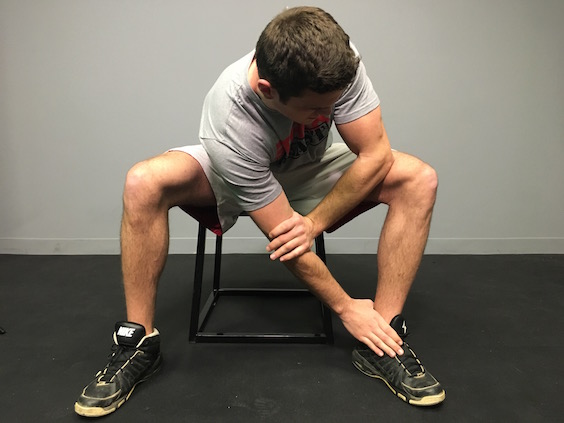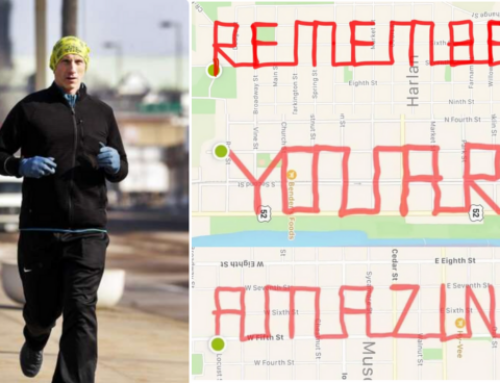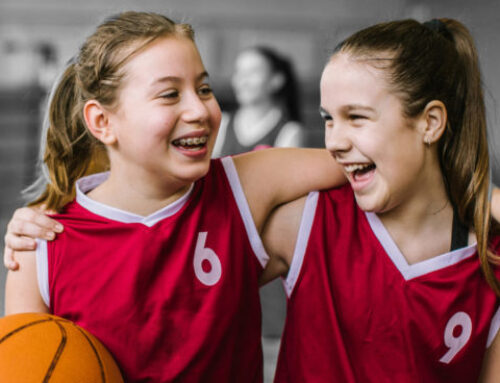Build Your Competitive Edge With Sleep And Nutrition
As an athlete, you want to put yourself in the right position to excel at your sport and compete at a high level. The first thing that comes to mind is practicing more. This includes extra shots after practice, lifting weights to become stronger, watching film and studying the game, or running bleachers to be in top shape.
If done consistently, there’s no doubt that all these “extras” will help you become a better player. Now, imagine if you spent just as much dedication and energy on your nutrition and sleep?
Eating nourishing foods, drinking enough water, and getting quality sleep are skills that we can practice every day to become healthier versions of ourselves. They aren’t all that flashy but, helping you stay energized, nourished, and prepared to be your best any day of the week.
Build Your Competitive Edge With Sleep And Nutrition
Hydration
Regardless if it is game day or not, proper hydration is key to moving and feeling your best. The body uses water to transport oxygen and nutrients to your cells while washing waste products and toxins away from them. And when it comes to your performance, a drop in just one percent of hydration levels can result in a 10 to 15 percent decrease in maximal strength and power output. Simply put, if you are just a little bit dehydrated before a workout or game, you may not jump as high, be as quick to react, run as fast, or be as strong as if you were well hydrated.
Aim for at least 1 ounce of water per pound of body weight each day. For a 150-pound person, they would need at least 100-150 ounces of water per day. The big 32 oz reusable water bottles work great. Carry it around with you at all times and sip on it regularly.
Nutrition
An ideal plate for an athlete has a balance of nutrients at each meal. Each nutrient plays an integral part in helping your body operate. Also, each nutrient works better when combined with one another. Think of this when it comes to your sport, you may be a good player, but you will not win the game by yourself — you need your teammates to play your best. To maximize performance and muscle recovery, aim for 3-4 balanced meals daily.
Build Power With Protein:
Protein helps build muscle, recover the body, and help your immune system function properly. Protein is essential in recovering your body after a workout or competition. Because our bodies use protein consistently, we have to keep replenishing protein levels throughout the day. Strive for 1 or more palm-sized portions —25-35 grams of protein— at every meal.
Prevent With Produce
Think of fruits & vegetables as a natural multivitamin that helps the body run smoothly, recover faster, and support a strong immune system. Aim for 3 colors of veggies & whole fruit on your plate at each meal.
Fuel With Carbohydrates
Carbohydrates from whole grains and fruit are the primary fuel for the body—especially high-intensity activities like sports and exercise. Just like protein, the more you exercise and play your sport, the more you need in that given day. Aim for whole fruits and grains that are minimally processed like sprouted-grain bread, rice, beans, quinoa, rice cakes, and potatoes. Eat 1-2 cupped hand-sized portions each meal—especially before and after activity. Strive for 3-6+ cupped hand portions daily.
Protect With Fats
Healthy fats contain powerful nutrients and antioxidants that repair joints, organs, skin, and hair. They also help in absorbing vitamins from the fruits and veggies we eat. Fats from Omega-3 fatty acids—like nuts, seeds, avocado, and salmon—boost brain power, mental clarity, and memory, giving you an athletic edge. Eat 1 thumb-sized portion each meal. Strive for 3-4 thumb-sized portions daily.
Balanced Meals
Create more balanced eating habits by spreading your meals and snacks evenly throughout the day. To maximize performance and recovery aim for 3-4 meals daily. You may even need 1-2 smaller snacks—like a piece of whole fruit or a nut and seed-based bar—between practices and training.
Athletes who do an excellent job at creating balance by evenly spread out eating tend to:
- have more sustained energy throughout the day
- better body composition to support the demands of their sport (more lean muscle & less body fat)
- perform at higher intensities for longer durations throughout practices, workouts, and games
- recover faster post-exercise
An erratic eating schedule and unbalanced eating habits lead to athletes:
- having less overall energy
- feeling sluggish throughout the day
- experiencing fatigued earlier during practices, workouts, and games
- recovering slower post-exercise
Use this helpful guide to know what and when to eat before a game or workout. This guide will help you know what to eat after games to repair your muscles and accelerate recovery on the other side of the coin.
Sleep And Recovery
Sleep is when recovery and repair to our bodies happen the most. It’s also the best time for our brains to process the information that has happened throughout the day. It’s when we form memories and hold on to information that is important to us while filtering out the stuff that we don’t need. When it comes to sport, we need our bodies to able to recovery quickly and our brains to be sharp in remembering plays and reacting accordingly. This is important for the growth and development of an athlete looking to take it to the next level.
Suppose you are trying to make it to the college level. In that case, you will have early 6:00 am workouts weekly and have to travel early for afternoon games regularly. This will help you establish a routine early and stay ahead of your competition.
Erratic sleep patterns can leave you feeling out of whack and sluggish. There are very few young athletes who focus on sleep so a regular sleep schedule will create a competitive edge. Just a few adjustments to your daily routine can help you go to bed and wake up at the same time every day. These tips will help you take control of your internal clock so you can constantly sleep better, recover faster, and wake up energized.
Be Consistent
Pick a bedtime and a wake-up time—and stick to them as much as possible. Life will inevitably interfere, but try not to sleep in for more than an hour or two, tops, on Saturdays and Sundays so that you can stay on track. That way, your body’s internal clock will get accustomed to a new bedtime, which will help you fall asleep better at night and wake up more easily each morning.
Make Gradual Adjustments
You won’t be able to change your sleep schedule overnight. The most effective tactic is to make small changes slowly. If you’re trying to go to sleep at 10:00 pm, rather than midnight, for example, try this: For the first three or four nights, go to bed at 11:45 pm, and then go to bed at 11:30 pm for the next few days. Keep adjusting your sleep schedule like this. By working in 15-minute increments, your body will have an easier time adjusting.
See The Morning Light
Your body’s internal clock is sensitive to light and darkness, so getting a dose of the sun first thing in the morning will help you wake up. Opening the curtains to let natural light in your bedroom or having a cup of coffee on your sun-drenched porch will cue your brain to start the day.
Dim The Lights
Likewise, too much light in the evenings can signal that you should stay awake. Before bedtime, dim as many lights as possible and turn off bright overhead lights. Avoid computers, tablets, cell phones, and TV an hour before bed since your eyes are susceptible to the blue light from electronic screens. Quiet reading, stretching or foam rolling, and listening to soothing music are examples of ways to get into the right frame of mind for sleep without the screentime.
Skip The Snooze Button
Though it’s certainly tempting to hit the snooze button in the morning to get a few extra winks, resist. The first few days of getting up earlier won’t be easy, but post-snooze sleep isn’t high quality. Instead, set your alarm to the time that you actually need to get up and remember that it may take a few minutes for your body to adjust to a daytime rhythm.
Putting It All Together
These food and sleep habits will take some time to dial in, but you will feel and see the advantage that you gain come game time when you finally do. Just like your sport, these are skills that take practice and reps. When it comes down to it, you don’t just want to survive or even compete in your sport—you want to win!
These are the daily habits of a winning athlete:
- Carry a water bottle around with them so they are always hydrated
- Eat 3-4 balanced, nutrient-dense meals a day that incorporates protein, vegetables, carbs, and healthy fat
- Evenly spread out meals throughout the day and never skip breakfast
- Eat at least 2-3 colors of fruits and vegetables in each meal
- Have an established sleeping routine including consistent waking/sleeping times and limiting screen usage 60 minutes before bed
- Prioritize getting 7-8 hours of interrupted sleep every night
Read More
- Sports Tournament and Traveling Nutrition
- Fuel Up Properly for Soccer Tournaments
- How to Recover From a Soccer Game or Workout
RECOMMENDED FOR YOU
MOST POPULAR
Build Your Competitive Edge With Sleep And Nutrition
As an athlete, you want to put yourself in the right position to excel at your sport and compete at a high level. The first thing that comes to mind is practicing more. This includes extra shots after practice, lifting weights to become stronger, watching film and studying the game, or running bleachers to be in top shape.
If done consistently, there’s no doubt that all these “extras” will help you become a better player. Now, imagine if you spent just as much dedication and energy on your nutrition and sleep?
Eating nourishing foods, drinking enough water, and getting quality sleep are skills that we can practice every day to become healthier versions of ourselves. They aren’t all that flashy but, helping you stay energized, nourished, and prepared to be your best any day of the week.
Build Your Competitive Edge With Sleep And Nutrition
Hydration
Regardless if it is game day or not, proper hydration is key to moving and feeling your best. The body uses water to transport oxygen and nutrients to your cells while washing waste products and toxins away from them. And when it comes to your performance, a drop in just one percent of hydration levels can result in a 10 to 15 percent decrease in maximal strength and power output. Simply put, if you are just a little bit dehydrated before a workout or game, you may not jump as high, be as quick to react, run as fast, or be as strong as if you were well hydrated.
Aim for at least 1 ounce of water per pound of body weight each day. For a 150-pound person, they would need at least 100-150 ounces of water per day. The big 32 oz reusable water bottles work great. Carry it around with you at all times and sip on it regularly.
Nutrition
An ideal plate for an athlete has a balance of nutrients at each meal. Each nutrient plays an integral part in helping your body operate. Also, each nutrient works better when combined with one another. Think of this when it comes to your sport, you may be a good player, but you will not win the game by yourself — you need your teammates to play your best. To maximize performance and muscle recovery, aim for 3-4 balanced meals daily.
Build Power With Protein:
Protein helps build muscle, recover the body, and help your immune system function properly. Protein is essential in recovering your body after a workout or competition. Because our bodies use protein consistently, we have to keep replenishing protein levels throughout the day. Strive for 1 or more palm-sized portions —25-35 grams of protein— at every meal.
Prevent With Produce
Think of fruits & vegetables as a natural multivitamin that helps the body run smoothly, recover faster, and support a strong immune system. Aim for 3 colors of veggies & whole fruit on your plate at each meal.
Fuel With Carbohydrates
Carbohydrates from whole grains and fruit are the primary fuel for the body—especially high-intensity activities like sports and exercise. Just like protein, the more you exercise and play your sport, the more you need in that given day. Aim for whole fruits and grains that are minimally processed like sprouted-grain bread, rice, beans, quinoa, rice cakes, and potatoes. Eat 1-2 cupped hand-sized portions each meal—especially before and after activity. Strive for 3-6+ cupped hand portions daily.
Protect With Fats
Healthy fats contain powerful nutrients and antioxidants that repair joints, organs, skin, and hair. They also help in absorbing vitamins from the fruits and veggies we eat. Fats from Omega-3 fatty acids—like nuts, seeds, avocado, and salmon—boost brain power, mental clarity, and memory, giving you an athletic edge. Eat 1 thumb-sized portion each meal. Strive for 3-4 thumb-sized portions daily.
Balanced Meals
Create more balanced eating habits by spreading your meals and snacks evenly throughout the day. To maximize performance and recovery aim for 3-4 meals daily. You may even need 1-2 smaller snacks—like a piece of whole fruit or a nut and seed-based bar—between practices and training.
Athletes who do an excellent job at creating balance by evenly spread out eating tend to:
- have more sustained energy throughout the day
- better body composition to support the demands of their sport (more lean muscle & less body fat)
- perform at higher intensities for longer durations throughout practices, workouts, and games
- recover faster post-exercise
An erratic eating schedule and unbalanced eating habits lead to athletes:
- having less overall energy
- feeling sluggish throughout the day
- experiencing fatigued earlier during practices, workouts, and games
- recovering slower post-exercise
Use this helpful guide to know what and when to eat before a game or workout. This guide will help you know what to eat after games to repair your muscles and accelerate recovery on the other side of the coin.
Sleep And Recovery
Sleep is when recovery and repair to our bodies happen the most. It’s also the best time for our brains to process the information that has happened throughout the day. It’s when we form memories and hold on to information that is important to us while filtering out the stuff that we don’t need. When it comes to sport, we need our bodies to able to recovery quickly and our brains to be sharp in remembering plays and reacting accordingly. This is important for the growth and development of an athlete looking to take it to the next level.
Suppose you are trying to make it to the college level. In that case, you will have early 6:00 am workouts weekly and have to travel early for afternoon games regularly. This will help you establish a routine early and stay ahead of your competition.
Erratic sleep patterns can leave you feeling out of whack and sluggish. There are very few young athletes who focus on sleep so a regular sleep schedule will create a competitive edge. Just a few adjustments to your daily routine can help you go to bed and wake up at the same time every day. These tips will help you take control of your internal clock so you can constantly sleep better, recover faster, and wake up energized.
Be Consistent
Pick a bedtime and a wake-up time—and stick to them as much as possible. Life will inevitably interfere, but try not to sleep in for more than an hour or two, tops, on Saturdays and Sundays so that you can stay on track. That way, your body’s internal clock will get accustomed to a new bedtime, which will help you fall asleep better at night and wake up more easily each morning.
Make Gradual Adjustments
You won’t be able to change your sleep schedule overnight. The most effective tactic is to make small changes slowly. If you’re trying to go to sleep at 10:00 pm, rather than midnight, for example, try this: For the first three or four nights, go to bed at 11:45 pm, and then go to bed at 11:30 pm for the next few days. Keep adjusting your sleep schedule like this. By working in 15-minute increments, your body will have an easier time adjusting.
See The Morning Light
Your body’s internal clock is sensitive to light and darkness, so getting a dose of the sun first thing in the morning will help you wake up. Opening the curtains to let natural light in your bedroom or having a cup of coffee on your sun-drenched porch will cue your brain to start the day.
Dim The Lights
Likewise, too much light in the evenings can signal that you should stay awake. Before bedtime, dim as many lights as possible and turn off bright overhead lights. Avoid computers, tablets, cell phones, and TV an hour before bed since your eyes are susceptible to the blue light from electronic screens. Quiet reading, stretching or foam rolling, and listening to soothing music are examples of ways to get into the right frame of mind for sleep without the screentime.
Skip The Snooze Button
Though it’s certainly tempting to hit the snooze button in the morning to get a few extra winks, resist. The first few days of getting up earlier won’t be easy, but post-snooze sleep isn’t high quality. Instead, set your alarm to the time that you actually need to get up and remember that it may take a few minutes for your body to adjust to a daytime rhythm.
Putting It All Together
These food and sleep habits will take some time to dial in, but you will feel and see the advantage that you gain come game time when you finally do. Just like your sport, these are skills that take practice and reps. When it comes down to it, you don’t just want to survive or even compete in your sport—you want to win!
These are the daily habits of a winning athlete:
- Carry a water bottle around with them so they are always hydrated
- Eat 3-4 balanced, nutrient-dense meals a day that incorporates protein, vegetables, carbs, and healthy fat
- Evenly spread out meals throughout the day and never skip breakfast
- Eat at least 2-3 colors of fruits and vegetables in each meal
- Have an established sleeping routine including consistent waking/sleeping times and limiting screen usage 60 minutes before bed
- Prioritize getting 7-8 hours of interrupted sleep every night
Read More
- Sports Tournament and Traveling Nutrition
- Fuel Up Properly for Soccer Tournaments
- How to Recover From a Soccer Game or Workout











